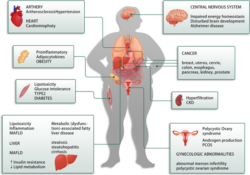Insulin Resistance Epidemic
Significant Health Challenge of Our Time
Good News: it is treatable!
Understanding Insulin Resistance and Its Impact on Health
Insulin resistance is not just a medical condition—it’s a silent epidemic that’s rapidly becoming one of the most significant health challenges of our time. I chose to focus on this topic because of its profound and far-reaching impact on human health and longevity.
Unfortunately a large number of my patients have insulin resistance.
What is Insulin Resistance?
Visualise your body as a well-oiled mechanism, with insulin serving as the key that enables cells to allow sugar to enter for energy. Now, visualise the consequences of this system malfunctioning:
Your body’s cells begin to disregard insulin, much like rebellious adolescents disregarding their parents. This compels your pancreas to produce an increasing amount of insulin in an effort to regulate the increasing levels of blood sugar.
The Complicated Situation
As sugar levels increase, it begins to behave as an adhesive within the body. These sugar molecules adhere to your proteins, which are the fundamental components of your body, causing them to become disorganised, much like glue in hair.
The Body’s Confusion
1. Protein Malfunction: Your proteins are no longer functioning effectively due to their sugar coating. It is akin to attempting to use Lego pieces that have been taped over; they simply do not fit properly anymore.
2. Internal Alarm: Your body perceives these sugar-coated proteins as intruders, which induces inflammation throughout your body.
3. Rapid Ageing: This sugar invasion accelerates the ageing process, resulting in wrinkles, rigid joints, and even a decline in cognitive function.
The Invisible Danger
What is the most frightening aspect? Silently, this transpires. Your body may be gradually deteriorating, despite the fact that you may feel good for years.
The Reasons for Your Concern
– This is not solely about diabetes; it is about the premature ageing of your entire body. This sugar invasion is causing damage to your epidermis, muscles, brain, and organs.
– The more time passes, the more difficult it becomes to undo.
It is important to bear in mind that the food you consume and the way you live today can either maintain the functionality of your body or result in a viscous, malfunctioning disaster. Choose judiciously; the decision is yours.
As a doctor, cosmetic and functional, I am passionate about reversing insulin resistance which I regard as one of my greatest enemies. I would be very happy to test, advise and guide anyone concerned about “body malfunctioning”.
The Good News is: INSULIN RESISTANCE IS TREATABLE AND ITS HARMFUL EFFECTS CAN BE REVERSED
Incidence and Prevalence of Insulin Resistance
- Prevalence: Increasing globally,
- Risk Factors: Sedentary lifestyles, high-calorie diets, obesity, age, genetics, and poor physical activity.
- Alarm: Rising cases in younger age groups due to lifestyle and diet trends.
- PCOS (polycystic ovarian hormone) is a common condition where insulin resistance plays havoc.
How Insulin Resistance Affects Metabolic Health
- Metabolic Syndrome: Insulin resistance contributes to a cluster of symptoms (high blood pressure, abdominal fat, high blood sugar) that increase heart disease risk.
- Chronic Inflammation: Insulin resistance leads to a state of inflammation, worsening metabolic imbalance.
Insulin Resistance and Cardiovascular Health
- Effects on Heart: Raises blood pressure, increases LDL (bad) cholesterol, and reduces HDL (good) cholesterol.
- Atherosclerosis Risk: Promotes plaque buildup in arteries, raising risk of heart attack and stroke.
- Chronic Inflammation: Further damages blood vessels, significantly straining cardiovascular health.
Effects on the Liver – Non-Alcoholic Fatty Liver Disease (NAFLD)
- NAFLD Link: Insulin resistance leads to fat buildup in the liver, disrupting its function.
- Progression Risks: Can lead to liver fibrosis or cirrhosis.
- Health Implications: Poor liver health affects other organs due to the liver’s role in cholesterol and glucose management.
Insulin Resistance and Kidney Health
- Kidney Strain: High blood sugar overworks kidneys, reducing filtration rates and leading to chronic kidney disease.
- Blood Pressure Impact: High blood pressure from insulin resistance further harms kidney function.
- Inflammation Role: Chronic inflammation from metabolic syndrome exacerbates kidney damage.
Insulin Resistance and Skin Health
- PCOS which is associated with insulin resistance causes resistant acne, skin inflammation, excess of facial hair and scalp hair loss.
- Visible Signs: Causes skin issues like acanthosis nigricans (darkened skin patches), skin tags, and acne.
- Skin Aging: Insulin imbalance accelerates skin aging by impacting collagen production.
- Managing Skin Health: Addressing insulin resistance can improve skin conditions and appearance.
Impacts on Other Organs and the Nervous System
- Brain Health: Linked to cognitive decline and neurodegenerative diseases like Alzheimer’s.
- Insulin and Brain Function: The brain relies on insulin for glucose uptake; resistance disrupts memory and cognition.
- Eye Health: Contributes to diabetic retinopathy, which can cause blindness.
Insulin Resistance and the Immune System
- Weakened Immunity: Reduces immune response, increasing susceptibility to infections and slowing healing.
- Inflammation Link: Tied to inflammatory and autoimmune conditions, further weakening immunity.
The key steps to manage this very common and serious condition are:
SCREEN! TEST! TREAT!





